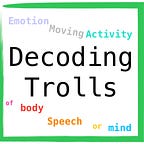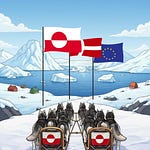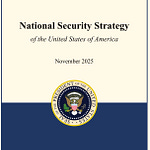Decoding interviewed by Ronan Swift.
Hello everybody, I'm Ronan Swifty and this morning I'm going to be talking to At Decoding Trolls. Hi, I'm Decoding Trolls. Great to be with you. Nice to meet you, Ronan. Thanks for stepping into my podcast arena. I want to get onto the name because I know it's a project of yours, Decoding Trolls.
I can understand the decoding bit, I think. But the troll side of it for me that was always trolling was something that I just associate with people being nasty to other people online. What is it that you understand by troll and trolling and is there more to it than what I originally thought?
I see trolling as it's about movement. And my definition of trolling is emotion, moving activity of body, speech, and mind. And most conceptions of trolling focus only on the medium like the internet. And so we focus on a particular form of communication in a particular arena. I researched many different aspects of trolling through academia, myself participating in groups online, and that led me to look into the linguistic root of trolling, which in fact led me into folklore, which is the origin of the metaphor of trolls. And eventually I realized that actually trolling on the internet is merely one form of communication.
And if we are going to understand how trolling on the internet works, then it's a good idea to look at how we troll each other in real life as well. And so that led to me to this conception that trolling is any form of communication which moves the emotions of another person.
And then I realized actually sometimes I'm trolling myself internally. And so this is partly how I arrived at the definition of trolling is any emotion moving activity of body speech and mind and so we can fit how our any sentient being trolls us our cat for instance wants some food and or they're running around our legs as we're coming in with lots of shopping and there's lots of children around and we we feel a bit annoyed or great joy, and that that feeling of emotion is what's essential to trolling, whether it's online or in real life. And it can be positive or negative. It doesn't have to be negative?
Absolutely, yeah. So once you see trolling as any emotion-moving activity of body, speech and mind, then we need a way to determine the quality of the troll to ascertain, is it positive, neutral, and the clue there is in the trial, neutral, no movement, or negative.
And so that led me on a hunt for a way of determining the quality of particular, I call them, I mean, informational units or memes, where meme can be isn't isn't a cartoon online it's any informational unit whether it's a sound or a word or a whole essay for instance well that's probably a bad example and so then once you see it as every form of communication you need you need a way of thinking okay because we get trolled positively all the time by our lover our romantic partner uh will um will have particular routines and we'll have particularly routine nice routines with our pets or our lovers or our wives or our husbands or our children which bring us great joy and what we're doing is purposefully moving their emotions and that that's positive And so I was hunting for a way of determining what's positive and negative and neutral. And that's how I arrived at what I call the code of positive trolls. I see.
So you've got a code, a checklist of sorts to determine that positive or negative or neutral. And that's the decoding part of the title.
Checklist is a great idea. And I actually hadn't made that link before. The code of positive trolls and decoding. Back in my past, I trained as a lawyer. So I was looking for a code. in terms of a law code criteria that that say judges use in cases to say to try and you know they often have these four limb tests to see whether you have the right to to do something without criminal liability for instance but I recognize that that now that the code is actually in the decoding as well that's really cool I got it from I was hunting around for this code and I found it actually in Tibetan Buddhism in and the Dalai Lama's form of Buddhism which is summed up into six by six criteria And if you perfect each of these six criteria, then in Buddhism, according to Buddhists, you will achieve enlightenment. Obviously, we're not looking for enlightenment when we're online or dealing with a really annoying situation and we're trying to resist making it worse by trolling the emotions of the person we're dealing with. But we are looking for codes which are proven, which have worked, and billions of Buddhists have run their life to a more successful or less successful extent according to these six criteria that I then rebranded as the code of positive trolls. And the idea is that you have this algorithm, these six criteria that you intuit, you learn them very quickly. And because billions of Buddhists have used this, what they call the six perfections, it's clear that humans can do this.
And if you proof any communication that's emanating from you, according to these six criteria, then you should be, if not achieving enlightenment, you should avoid or you have a chance of avoiding. trolling others in negative ways, in ways which you don't want to do, but equally when you're receiving communications from people, if you can run the sensory inputs, so what I call, I talk about having a troll radar. So we have this idea that we're now proofing communications as they're moving into our minds according to these six criteria. And if they contravene any of these six criteria, then we run a new battery of tests.
So that's what we're trying to do. We're trying to ensure that we don't get manipulated, our energy doesn't get manipulated negatively by others, and we're trying to avoid ourselves accidentally negatively manipulating others and so I use these six criteria to decode trolls my own trolls outgoing and incoming trolls as well and I've been using this for three years now I think the listeners are on tenterhooks as regards
what this code of six is because it's been mentioned a lot so Is it helpful just to list them all?
Totally. So, generosity, patience, ethical discipline, right, is the same as ethical discipline, patience, energy, manas, mana, what I call mana, energy, focus, and insight. So six of them. So generosity, so is the message you are communicating to someone else an act of generosity? equally is the message you're receiving from someone else.
Say it's a post about migration and they're saying, you know, our house is full, we can't take any more migrants, they're stealing our jobs, they're eating our dogs. That is not generous. So sometimes trolls fail that. The second one is right, ethical. discipline. It's always wrong to breach the laws of the land, international law, and this set of ethics are, in the context say of migration, set by the Refugee Convention, which every most countries in humanity have signed which means that if you have a well-founded fear of persecution you have the right to seek asylum so this idea of illegal migrants illegal asylum seekers not only is that not generous but it's a breach of the law and it's not right in that sense patience you want to communicate that you are yourself patient and obviously Most of us fail on this front a million times a day. So it's an aspiration. But if you see in the message, some of us in work will have done these courses on how to avoid being trolled or phished online. And they'll always say one of the... one of the triggers for this is is someone putting you in a pressure cooker situation are they saying you have to use five seconds to press this button uh respond to this email immediately otherwise your bank accounts will be uh so that so this is where the patience element comes in that when you're receiving these trolls if they're putting you in a patient's thing So a political campaign like Donald's campaign will say, vote for me to save America. And you've got five days to save America.
And sometimes, again, you will need to react quickly. So this is why I say it's just... if it contravenes, if the incoming troll or your outgoing troll contravenes this patient's criterion, then you should run another battery of tests to make sure, okay, is this, is someone trying to phish my email or my bank accounts?
And what I mean by the The fourth criterion, which is energy or mana, or another way of putting it is joyous perseverance. But the mana is basically you're looking for the energy in the meme. So the energy that you are communicating to other people and that is in the meme that they're communicating to you, simply by looking for what's imminent in it, and trying to come to a decision about what it is. We've all been in herd situations, maybe at a football game or a concert, where we got lost in the crowd and we are receiving the emotions of others and we're transmitting them and we become panicked, for instance, in cases of where there's a fire or something like that. So by the fourth criterion, what I mean is look for the energy that you are communicating onward and make sure that you're consciously aware of what it is and that the energy that you're communicating is is how you want to communicate.
I mean, a lot of people, a lot of us have a problem saying no. And sometimes we try to communicate this, we communicate this in a bad way. And so you're looking for the manner in the meme. You're looking for the manner that you're communicating outwards and which others are communicating to you.
And if it's bad energy, then that will fail the code of positive trolls. The fifth criterion is focus. So in order to do this, you need to be focused. You need to be focused on your outgoing communications and your incoming communications. And insight. Is it insightful? So we all enjoy a joke and things which don't matter.
But we should look into, like there's a certain form of humour. I'm thinking, for instance, Ricky Gervais and the UK office. where every joke is at the expense of someone. And a lot of us engage in this kind of humor, and it's not insightful. And so if we use these six criteria, we prove any outgoing communication, according to them and any incoming. And if it fails any of them, then we can run a new battery of tests. And obviously we need to do this instantaneously. So Rome wasn't built, and you as a classical scholar, Ronan will know this, Rome wasn't built in one day.
So I'm setting out the six criteria in the Code of Positive Controls as a beginning for us to begin to learn how better to control Rome. what we communicate outwards and what we let into our mind.
Yeah, because it does sound like a lot to process for every interaction that we might have. And in our daily lives, we have so many different interactions that we're receiving and broadcasting. But it becomes something that if we're alert to it, we do much more quickly and more naturally all the time.
Yeah, I think the generosity... That's the hope. The generosity one is... That's why it's number one. Because many of us... All of us have a sense of what's generous and what isn't. When we're not being generous, we kind of know about it. And we made a decision not to be...
Perhaps we've got to save money and we've got to look after ourselves and our family. But we know that we're not giving money to, for instance, the beggar on the street. We know we're not being generous to our friend who's clearly distraught and we just don't have time to talk to them. So it's an intuitive sense.
So we often make that judgment in our interactions and in our conversations and in our conversations. daily life with our colleagues sometimes it's justified not to be generous and other times it isn't but it's a matter of if if the communication isn't generous either outgoing or incoming then then we need to check a bit more carefully what we're doing provided we want to care about yeah you alluded to Two different areas. I don't know if we've time to touch on them at all, but we'll try. I'm generous about my time. Let's go for it. Just at the very outset, you mentioned the folkloric element to where the word for this comes from, trolling. And how is folklore helpful to us in any way in understanding this? trolls that may come our way?
So my own journey to look into trolling led me inevitably, obviously, into folklore because trolls, we know of trolls. The Billy Goats Gruff in Norway, is that right? Exactly, yeah. That was this troll tale that was published, first published in America in English translation around 1860.
And three billy goats went across a bridge and there's a troll guarding the bridge and they go trip, trap, trap, trap, trap, trip, trip, trip, trip. So it's this great sound in it. And when this story was published, it immediately captured the imagination of people and became embedded into our culture.
And the first billy goat crosses the bridge and comes to the troll and the troll says, I'm going to eat you. And he said, don't eat me. There's another billy goat coming along. He's much fatter than me. So why don't you eat him instead? And so that billy goat gets across. Then the second one comes. similar story and then um the third one uh comes so there's deception in there as well understand is internet trolling someone is it someone is not communicating a sincere emotion in order to provoke your emotions so there's the deception in that tale and then the third billy goat comes and he kills the troll to cut a long story short I'm sorry for rooting for you haven't read that story and that I started looking and I did this troll and troll mean search in American English so you will police forces will troll for criminals they'll look for criminals and that comes from this form of fishing which is different from trolling in English trolling where you drop the the bait on the water, on the top of the water, or inside the water, and you just move it around. So again, movement is in there, tra, transport, travel.
This movement is very deeply embedded into our language in these three, this sound, tra, tra. And so the bait is moving around the water, and eventually a fish comes up and bites it. And that metaphor from fishing is deeply embedded in American English, not so in English English.
But the troll tales are in English English through films, mainly from America. And when I looked into this and I looked at 75,000 appearances of the two words troll and trolling in this massive database of 64,000 different sources. when I started to research this, when I realized I didn't really know what trolling was.
And most of the appearances of troll and trolling appeared in the context of either looking for, in the fishing, looking for criminals. And then after 2008, 2009, in internet, Facebook trolling and actually funeral trolling, which was one of the first online forms that went mega, really in Australia, believe it or not, where people would troll parents who had lost children. And there was various legal cases about that. And then going backwards in time, there was this every decade going back really a century almost, there would be a troll craze sparked mainly after the 1950s by movies, different troll movies.
And some of us will remember a couple of these crazes and a couple of them are associated with troll dolls. And these dolls are made in a place called Oakland in California. which is part of Silicon Valley, it's part of Santa Clara County or it's adjacent to Santa Clara County.
And so trolls and trolling became part of early computer culture. And this is where the folklore that we think of from the Brothers Grimm and the troll tales meet the folklore of the internet. And this idea that in any particular community of people, whether you're a football fan or you work in a school or in an office, you have a shared sense of memory, which is communicated and recorded in stories about your colleague doing this and the time you did that and the time you accidentally drank the wrong cup and everyone remembers. And that's your kind of folklore memory. on a scale, on a micro scale as it were, and in early computer culture trolls were very much a part of the words and the words which we're using. And so you bring all of these different strands together and you, Ronan, for instance, might For you, trolling is you read Tolkien and there's trolls in Tolkien.
For me, I'm deeply embedded in Southern Californian computer culture from the 1980s. And trolls mean that for me. For our friend who's a policeman, for a Canadian or an American police person, trolling is about looking for criminals. For someone else, it's about fishing. And this...
this is a quality in in often in terms which we use we all have a slightly different meaning for them and that helps them gain uh gain currency and now today for most people uh they encounter trolls and trolling on the internet But all of us think it comes from a different place.
What is common to all these forms of trolling, which really helped me get to my definition of emotion, moving, activity, body, speech, and mind, is this TRA and this movement. And in early English, for instance, troll the bull means move the pipe. It's in Shakespeare. It's used in Shakespeare. And it goes back into... very deep into language.
So it's just, it's about movement is what I found the essential thing. And obviously, Emotion is the motion, this movement in emotion. And then there's moving, obviously is moving. Activity and activity is also moving. And these are the metaphors we use when we are going from one state of mind to another.
We're suddenly afraid because of an external sensory input or we've made someone afraid. that so that's where the folklore and what I realize if I if I have another second because it's about the trolls in Norwegian particularly Norwegian folklore the trolls aren't we often think of trolls as always negative and this was again a great clue for me but the folklore scholars will we'll talk about how trolls aren't always negative even in Norwegian folklore. Sometimes there's good trolls, there's bad trolls, and then there's new trolls. And again, that TRA is a neutral, no movement. So that helps us remember it. And trolls appear in Norwegian folklore.
You're walking through the countryside and just something, some energy appears and something happens to you. You get scared or joyful, but you're walking in a country lane at night. And then these phenomena were explained by reference to trolls. These appear in most of our cultures as fairies, as... Yeah, nymphs in ancient Greece. Exactly.
And India has their own sprites, Valkyries, Ruselkis in Slavic culture. And for me, I realised that these are probably all the same... things and it's analogous to when you're on the internet you open your your ex or your Facebook and you're in a great mood and then the first post comes up about something and suddenly your mood is transformed and that is that's the moment when we realize we've just been trolled and now we have to decide What has just happened to us? How can we avoid this in the future if we don't want it that way? And the stimulus for that, I'll just finish on that.
The stimulus for that is a modern form of folklore because you've opened up your Facebook and you're being told that your favorite hockey team has just lost. And this makes you really sad. And that itself is like a form of folklore in the community. You belong to the group that you belong to.
And so the trolling is multidimensional in that sense. I gotcha.
And the folkloric stories that possibly we know beyond just ones involving trolls bring me on to the next thing that you alluded to, I think, which is like the trolling and messages that we hear in our current affairs and our politics. And we're in a year of presidential elections in the USA, general election looming here in Ireland. and I just wonder if you could talk a little bit about elements of the trolling that may be happening on that wider political stage and whether or not it also feeds into stories that we all share from from the past, myths, legend, folklore, and if there are resonances there too.
Absolutely. I set out on a journey in autumn of the fall of 2019 to try and understand Donald Trump's mode of communication. I couldn't understand how how much of an impact it had on people. And when I did this troll or this troll of this database, many of the examples of trolling, particularly after 2010, related to Donald Trump and then basically after Twitter was founded and I found actually the first time Trump and trolling were associated in this database and it's from about 1989 Trump trolling for a buyer for his yacht and there's that meaning of trolling looking and so Sometimes think so some of us might remember computers used to have this thing called Intel inside chip inside and they were trying to tell us that this actual the processor was the computer was designed around this particular chip and my conception of positive trolling and negative trolling and neutral trolling and the code of positive trolls was really designed to help interpret Trump trolling. And therefore it's quite helpful in today's world. There was this moment after President Biden won the 2020 election, where I remember thinking, this was in the first few days after it became clear, I was like, great, I had a good run of it.
Trump is done and I've designed my computer system around an Intel chip, but now we've moved forward. We have a different type of computer system. I'll put this little chip in the museum. But then Jan 6th happened. And then the Jan 6th inquiry, which I listened to live at the time it happened.
Some of us might remember it took about a year, a year and a half for enough. We had the impeachment. He was impeached, but he wasn't convicted because of the votes of two MPs. Senators who had renounced and denounced President Trump or non-President Trump in 2016, but then they wouldn't convict him.
And then now here we are on the cusp of the 2024 election. And many of us are worried by the election and our worries are stoked, stoked by the news we hear all the time. And this reaches us everywhere. People who don't have any interest in American politics are fearful of the consequences.
And this is like a folkloric, like a horror story where inside horror story where we're talking to our mother or our child and they're communicating to us fear about the outcome of the US election and I can't explain how Trump and those around him worked this out that they could tell stories which I call dissent folklore.
They could tell stories that are often lies that communicate fear into other people's minds. That's very easy to do. We all do that accidentally or on purpose in various times of our lives. And it's not generous and it's not ethical if we do it purposefully. But anyway, we do it.
But the genius of these people and the people around him around Trump was to know that you could communicate fear into people's minds and then they would support you. So they would, and this is something that, for instance, wife beaters, have discovered in this idea of coercive control where people are in these relationships controlling relationships which and it's now defined in English law as of a couple years ago that a coercive control relationship where you and I are in a relationship and it seems like we're free but actually you're exercising psychological warfare on my mind and I'm basically enslaved to you and when this gets to a certain level it becomes illegal and unlawful and you can go to prison for doing it and there's really good tests, legal tests, for how you determine this. And we are in a form of coercive control or those people who are wrapped by this negative Trump does it himself.
So if you're signed up to one of his email lists, you'll be getting at this point in the election cycle, you'll be getting maybe 100 emails a day and some of them most of them will be communicating fear but then some of them will be saying i love you i love you uh you're great if you just pay this 15 euros in the next five minutes you can get a ride on my jet i love you all we're we're fine and and so it's this kind of uh love you hate you and that's the essence of coercive control and we have in this media environment at the moment We're all consuming this, not just from the radio, not just from the internet, but from our friends. We're in a coffee shop, we're chatting to people, we overhear people. Our mother might be worried. And out of this worry, they hope to create a sense of inevitability.
that Trump will win, and as a function of this, that people will vote for him. Oh, I'll vote for him because he will win. But what's common to all of this, and trying to get back to your question, excuse me, for droning on, is all of this is emotion moving.
And if we, at every moment, we feel our emotions moved, especially for fear, whenever you feel yourself afraid, it's harder than to rationally think, how can I avoid, how can I avoid being afraid? And so, and this is how they work. Basically, they trigger your emotions. So you experience fear and then they offer a bogus solution.
However, if you vote for me, there's no need to be afraid anymore. I'll save America. So on the one hand, it's saying America is dead. It's, it's a garbage can. It's the worst country in the world. But if you vote for me, I'll make it good again. And this is how this works.
So if we can just identify when we feel fear and obviously there's really important times we feel fear and we should run away straight away from the fear. But a lot of it, especially if it's in the media environment or the internet, you're in a great mood. You've just had a great moment with your lover.
And you open up your Twitter and immediately you feel this fear. Once you feel that emotion, that's when you need to think, okay, what algorithm can I use? And if it fails, the message, the meme fails, the code of positive trails, you're like, forget about it. I'm not letting this into my mind.
I'm not letting this affect my mood or my motivation. my attitude and and this this is how i would connect what's what we see going on in the information space today with um trolling and my idea of trying to go to positive troll well no a long answer is a good answer a comprehensive answer you've got given me lots of food for thought for the day i've got to have my radar and my focus up but always positive At Decoding Trolls, thank you so much for your time today. Thank you so much, Ronan. I really appreciate this.
I think we've got more to talk about in the future. Great.
And look for the mana in the meme.














